Storm water quality - it matters!
One thing that makes Littleton so special is our waterways, most of which have trails along them where people can enjoy these natural areas in the midst of the urban landscape. These waterways include Littles Creek, Lee Gulch, Jackass Gulch, Slaughterhouse Gulch, and of course our local gem, the South Platte River.
However, to maintain the vibrant plants, wildlife, and scenic beauty of these areas, the water must be clean and healthy. These creeks are fed by storm water, which runs off the ground surface when it rains. Along the way to the creeks, this runoff can pickup pollutants and trash from the roads, or from your front yard. As a result, it's important to be aware of storm water pollution, and help keep our creeks and waterways healthy!
Program Activities
When it rains, it drains. And it has to go somewhere.
Water from inside our homes goes to a wastewater facility for purification. But water from roofs, streets, and outdoor spigots goes untreated directly into storm drains - straight to our waterways - picking up all kinds of contaminants along the way!
Did you know?
Excess nutrients, specifically nitrogen and phosphorus, pollute storm water run-off from urban areas, contributing to the third-greatest cause of lake deterioration in the US. For more information and tips to preserve our waterways, download the Colorado Stormwater Council tip sheet(PDF, 2MB) and visit www.colorado-stormwater-council.org.
The City of Littleton is also a member of SPLASH (Stormwater Permittees for Local Awareness of Stream Health). Visit their website here: https://www.splashco.org/contact
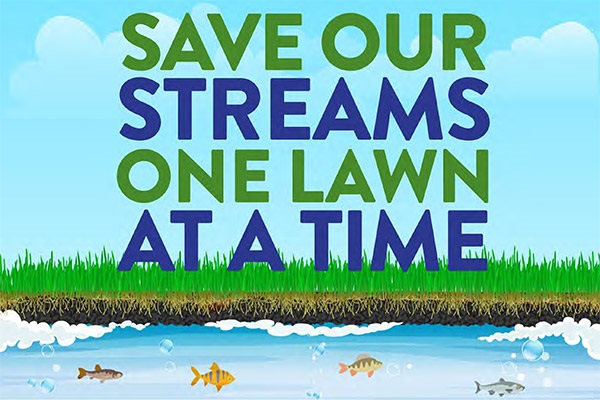
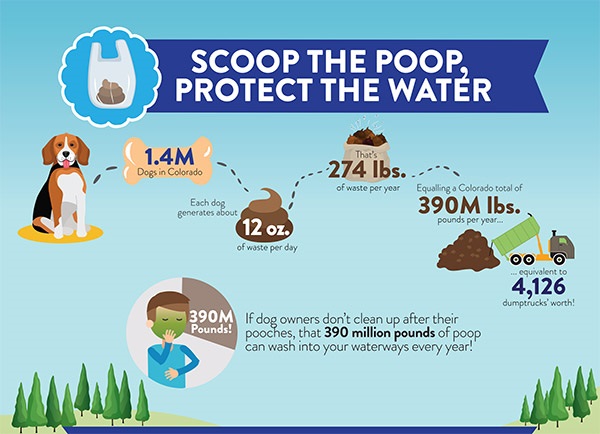
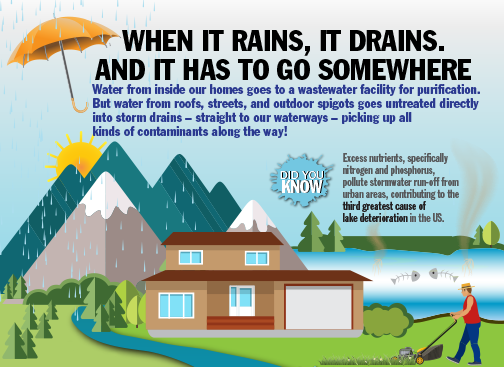
The State of Colorado requires that cities such as Littleton develop procedures and programs to help protect water quality. The State requires that Littleton implement the following programs into its city procedures:
- Public Involvement: Provide public notice of storm water policy and changes, and allow for review and comment .
- Public Outreach: Engage the public with educational outreach activities to inform of water quality and storm water issues, and ways to help improve water quality.
- Illicit Discharges: Prohibit illegal discharges of material into storm water, and have enforcement and cleanup procedures
- Construction Program: Require sediment and erosion control at construction sites, and monitor their effectiveness.
- Post-construction Program: Require that construction and developments implement permanent water quality treatment for their storm water runoff.
- Pollution prevention and good housekeeping: Ensure that all city operations and procedures are conducted in a way to minimize storm water pollution, and provide training to staff.
This is a very brief overview of the importance of storm water quality in our city, and the requirements of our permit with the state of Colorado. If you have additional more detailed questions, feel free to contact the Public Works Department at any time and ask for the storm water manager. Anyone from the public can view and comment on the city's Program Description Document (PDD). This document outlines how the city is meeting the State 's requirements.
Storm Water Program Description Document(PDF, 655KB)
The PDD is a living document and subject to change. The city tries to keep the most updated version online, but to ensure you are looking at the most recent document it is always best to contact the Public Works Department.
How else can citizens help?
- The city has a storm drain marking program! The Public Works department provides supplies and decals to mark storm water drains in the city to remind people to not dump into those drains. Please volunteer to help mark the city’s storm inlets and protect water quality to the streams and South Platte River!
- The city also helps to promote volunteer South Platte River trash cleanups each year. Be on the lookout in March and April each year (near Earth Day) for announcements on the Littleton Report Online and social media outlets.
Storm Inlet Marking Instructions (PDF)(PDF, 549KB)
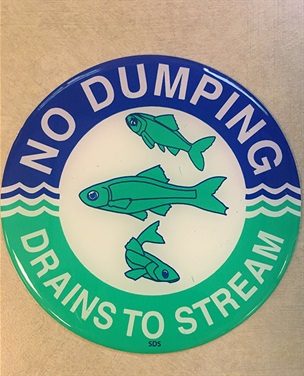
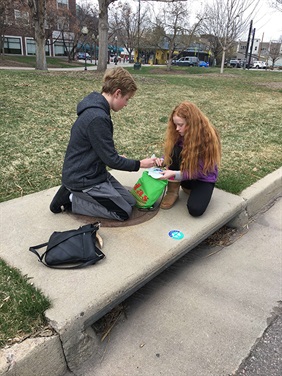
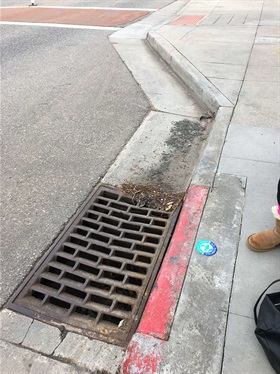
Additional videos from the Colorado Stormwater Council:
If you see anything suspicious in the water, such as a potential dumping or illegal discharge of motor oil or other substance, report it to our Hotline: 303-734-8299